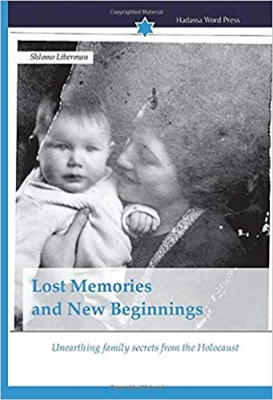Collaborator: A Tragic Figure or a Villain?
Lost Memories and New Beginnings:
Unearthing Family Secrets from the Holocaust
by Shlomo Liberman
ISBN: 978-3-639-79493-9
Hadassah Word Press, 2018
Paperback, 116 pages
From the publisher's website:
http://tinyurl.com/yd6gqy6f
€10.80 + shipping
Or from Book Depository:
http://tinyurl.com/y8nbmasd
NIS54 or $12.60 incl. free shipping
I have said it before, and I will say it yet again. Books dealing with the Holocaust must be judged on standards markedly different from those with which we judge other books. Whether written by people who experienced the events firsthand, or by the succeeding generation of the actual survivors, any account of the Holocaust is good history. But with Lost Memories and New Beginnings: Unearthing Family Secrets from the Holocaust, author Shlomo Liberman has given us a Holocaust book that is far beyond just "good". It is, in my opinion, a tour de force. Packed tightly within its 116 pages—which include a surprisingly comprehensive bibliography - Lost Memories is at once a detective story, a deeply personal narrative of self-discovery, and some very well-researched history. As if this were not enough, Liberman provides us with an extensive discussion of one of the most controversial figures in Jewish history, along with a surprising revelation.
Liberman's story starts in his childhood in Sweden, when he and his brother were looking through their family's old photo album and came upon a grainy old picture of a young woman holding an infant, whom the boys were unable to identify. They were aware that both of their parents were Holocaust survivors, their father from Lodz and their mother from Chrzanow, Poland. Neither parent spoke about the Holocaust, and getting information about those nightmare years was initially next to impossible. Nevertheless, Liberman resolved to find out as much as he could about his family's ordeal, their grim odyssey from home, to ghettos, to concentration camps and, finally, their postwar resettlement in Sweden, and Liberman's eventual aliyah to Israel and life in Raanana.
Liberman is not a trained "academic," but his book is both meticulously researched and annotated with numerous footnotes. At the same time, however, it is written in a clear, readable style that is often compelling. This is especially true of Liberman's account of the Lodz Ghetto, in which his paternal family were forced to reside, along with the rest of Lodz's sizable Jewish population.
But nothing reaches the gut-wrenching drama of the author's description and analysis of Chaim Mordechai Rumkowski, head of the Lodz Ghetto's Council of Elders, or Judenrat. Probably no other figure in Jewish history, with the possible exception the Second Temple Period historian Josephus, has aroused as much controversy and debate. In literally dozens of biographies, novels, histories of the Lodz Ghetto, as well as film and TV documentaries, Rumkowski has been analyzed and most often condemned as a monster and traitor to the Jews of Lodz.
Writers point out that when Adam Czerniaków, head of the Judenrat in Warsaw, found out that the transports of Jews from the Warsaw Ghetto were going directly to death camps like Auschwitz and Sobibor, he committed suicide. Not so Rumkowski, however. He continued to collaborate with the Germans, right up to the final liquidation of the Lodz Ghetto and his own transport to Auschwitz. Perhaps nothing is so well remembered about the self-styled "King of the Jews" as his response to German orders, on September 4, 1942, to plead with the Jews to deliver all of their children under the age of ten for transport "to the east". Rumkowski's anguished speech, "Give Me Your Children!" is among the most heartrending speeches in all of Jewish history, right up there with King Agrippa's 66 CE address to the Jews of Judea, warning them of the Romans' far greater strength and urging them not to provoke the war that in fact led to the destruction of the Second Temple and the loss of Jerusalem.
Liberman reproduces most of Rumkowski's now infamous speech, but joins a handful of other writers in suggesting that Rumkowski, working under impossible conditions, may have been more of a tragic figure than an outright villain, trying to save as many Jews as possible by following German orders and buying time. Liberman's treatment of Rumkowski is nuanced, befitting the complexity of the subject.
The story follows events through the end of the war, liberation and resettlement of Liberman's remaining relatives in Sweden, up to the present moment in Israel. How was Liberman's family able to remain in the Lodz Ghetto until almost the last day? Did Chaim Rumkowski have anything to do with keeping the family away from earlier transports? And who was the young woman and the baby in the old photograph which started Liberman on his quest for answers?
Read the book.








Comments